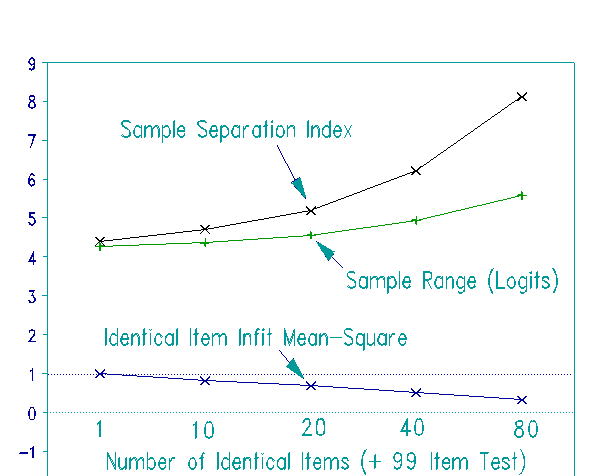
"One question I have is with the Rasch method's apparent failure to take account of redundant items. If the item scaling shows that all items are approximately equally spaced except for a few that are duplicates of other items (two items fall at same difficulty level), then the mapping of raw score onto Rasch ability level should take this into account, e.g., by weighting these items only .5 vs. the items that do not have duplicates being weighted 1.0." Roger Graves
What is a redundant item? For measurement purposes, we want an item that focuses on the same thing as the other items, but produces one item's worth of new information. A useful item is "as similar as possible, but as different as possible". Including the same item twice in a test is nearly always redundant. Such items do not provide two item's worth of new information, since responses to one are overly predictable from responses to the other. High inter-item dependency is typically flagged by fit statistics reporting overfit for redundant items. Dependency is also detected by response-residual analysis.
the effect of redundancy is to introduce a locally Guttman-like pattern into the data. Since Rasch measures are computed as though the data fit the model, this slightly distorts or biases the measures by locally increasing logit distances. Redundant, over-fitting or dependent items, however, rarely distort the measures enough to have any practical consequences.

The impact of redundancy in a simulated data set is shown in the Figure. The baseline consists of 100 persons taking a test of 100 dichotomous items in accordance with the Rasch model. Identical items are added to the test by copying the responses of the sample to an item at the center of the test. It is reassuring to see that large numbers of identical items have little impact on the measures. If measure bias due to item dependency is a concern, compare persons measures including and omitting those items.
Two items of the same difficulty may or may not be redundant. If responses to the two items are independent, then the items are not redundant in the measurement sense and do not distort the measures. They do increase the local precision of person measures. This is of benefit in computer-adaptive and criterion-based tests. But, if high precision is not needed, then multiple items of the same difficulty are not required, and there is pragmatic item redundancy. It may be beneficial to shorten the test, or to replace excess items of similar difficulty with items of different difficulties designed to fill gaps in the difficulty hierarchy. John Michael Linacre
Redundant Items, Overfit and Measure Bias Linacre, J.M. … Rasch Measurement Transactions, 2000, 14:3 p.755
| Forum | Rasch Measurement Forum to discuss any Rasch-related topic |
Go to Top of Page
Go to index of all Rasch Measurement Transactions
AERA members: Join the Rasch Measurement SIG and receive the printed version of RMT
Some back issues of RMT are available as bound volumes
Subscribe to Journal of Applied Measurement
Go to Institute for Objective Measurement Home Page. The Rasch Measurement SIG (AERA) thanks the Institute for Objective Measurement for inviting the publication of Rasch Measurement Transactions on the Institute's website, www.rasch.org.
| Coming Rasch-related Events | |
|---|---|
| Jan. 16 - Feb. 13, 2025, Fri.-Fri. | On-line workshop: Rasch Measurement - Core Topics (E. Smith, Winsteps), www.statistics.com |
| Apr. 8 - Apr. 11, 2026, Wed.-Sat. | National Council for Measurement in Education - Los Angeles, CA, ncme.org/events/2026-annual-meeting |
| Apr. 8 - Apr. 12, 2026, Wed.-Sun. | American Educational Research Association - Los Angeles, CA, www.aera.net/AERA2026 |
| May. 15 - June 12, 2026, Fri.-Fri. | On-line workshop: Rasch Measurement - Core Topics (E. Smith, Winsteps), www.statistics.com |
| June 19 - July 25, 2026, Fri.-Sat. | On-line workshop: Rasch Measurement - Further Topics (E. Smith, Winsteps), www.statistics.com |
The URL of this page is www.rasch.org/rmt/rmt143a.htm
Website: www.rasch.org/rmt/contents.htm